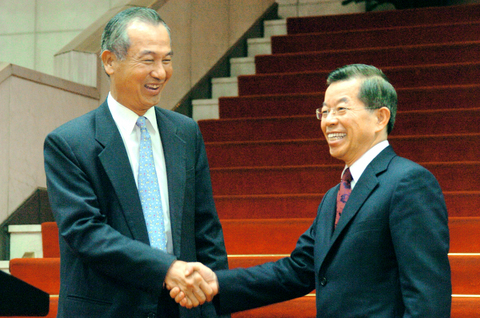Taiwan Institute of Economic Research (TIER) President Wu Rong-i (
"I am quite confident that I will take advantage of my expertise in economic issues to provide my professional analysis, study and advice to help Premier Frank Hsieh," Wu said during a press conference at the Cabinet yesterday morning.

PHOTO: SEAN CHAO, TAIPEI TIMES
After Hsieh became premier on Jan. 25, he lobbied to have KMT lawmaker Chiang Pin-kun (江丙坤), who is also vice chairman of the party and former chairman of the Council for Economic Planning and Development, to become vice premier. However, KMT Chairman Lien Chan (連戰) never gave his blessing to the appointment, and so Chiang did not give Hsieh an answer to his offer.
Hsieh said that he had considered Wu as a second choice for the spot, because his priority had been to try to get a member of the opposition camp to join the Cabinet.
"While I first spoke with Wu, I explained clearly to him that my priority was Chiang due to political concerns, and he understood and supported me for this arrangement," Hsieh said. "For that, I appreciate his understanding and would like to apologize to him for keeping him waiting and making him my second choice."
At the press conference, Hsieh said that he had opened the door to Chiang to join the Cabinet, but that he could not keep his team and the public waiting indefinitely.
Wu is a well-known supporter of former president Lee Teng-hui's (
Asked whether he will continue to urge local enterprises not to invest in or move their facilities to China, Wu said that he will merely provide his professional advice to his superiors.
Opposition parties were negative in their reaction to the news of Wu's appointment yesterday.
"Currently, I can't see how this appointment will have any effect on improving Taiwan's economy, because Wu Rong-i is conservative in his policy about investing in China," People First Party (PFP) legislative whip Liu Wen-hsiung (
"The KMT respects the wishes of the DPP and the premier," said Chinese Nationalist Party (KMT) legislative caucus whip Huang Teh-fu (黃德福) yesterday. "What we care about the most is whether they will nominate capable individuals. But from past examples, we can see that even if talented individuals enter the Chen Shui-bian administration, under a such a willful leadership, those individuals will burn out."
Leaders of business groups, who have been urging that someone with a business background be named as vice premier, yesterday welcomed Wu's appointment, but also expressed regret that Chiang had not taken up the post.
"Wu is an appropriate pick for the position, considering his sophisticated management ability and insights into macroeconomic and industrial policies," Theodore Huang (
Although Wu has less political experience than Chiang, as president of the Taiwan Institute of Economic Research (
Wu possesses a doctoral degree in economics from Katholieke Universiteit Leuven in Belgium. He has been president of TIER since 1994. Prior to that post, he was an economics professor and director at National Chung Hsing University. Wu has also been a senior economic advisor to different government offices, including the Presidential Office, the Cabinet and the Ministry of Finance.

DAREDEVIL: Honnold said it had always been a dream of his to climb Taipei 101, while a Netflix producer said the skyscraper was ‘a real icon of this country’ US climber Alex Honnold yesterday took on Taiwan’s tallest building, becoming the first person to scale Taipei 101 without a rope, harness or safety net. Hundreds of spectators gathered at the base of the 101-story skyscraper to watch Honnold, 40, embark on his daredevil feat, which was also broadcast live on Netflix. Dressed in a red T-shirt and yellow custom-made climbing shoes, Honnold swiftly moved up the southeast face of the glass and steel building. At one point, he stepped onto a platform midway up to wave down at fans and onlookers who were taking photos. People watching from inside

MAKING WAVES: China’s maritime militia could become a nontraditional threat in war, clogging up shipping lanes to prevent US or Japanese intervention, a report said About 1,900 Chinese ships flying flags of convenience and fishing vessels that participated in China’s military exercises around Taiwan last month and in January last year have been listed for monitoring, Coast Guard Administration (CGA) Deputy Director-General Hsieh Ching-chin (謝慶欽) said yesterday. Following amendments to the Commercial Port Act (商港法) and the Law of Ships (船舶法) last month, the CGA can designate possible berthing areas or deny ports of call for vessels suspected of loitering around areas where undersea cables can be accessed, Oceans Affairs Council Minister Kuan Bi-ling (管碧玲) said. The list of suspected ships, originally 300, had risen to about

A Vietnamese migrant worker yesterday won NT$12 million (US$379,627) on a Lunar New Year scratch card in Kaohsiung as part of Taiwan Lottery Co’s (台灣彩券) “NT$12 Million Grand Fortune” (1200萬大吉利) game. The man was the first top-prize winner of the new game launched on Jan. 6 to mark the Lunar New Year. Three Vietnamese migrant workers visited a Taiwan Lottery shop on Xinyue Street in Kaohsiung’s Gangshan District (崗山), a store representative said. The player bought multiple tickets and, after winning nothing, held the final lottery ticket in one hand and rubbed the store’s statue of the Maitreya Buddha’s belly with the other,

Japan’s strategic alliance with the US would collapse if Tokyo were to turn away from a conflict in Taiwan, Japanese Prime Minister Sanae Takaichi said yesterday, but distanced herself from previous comments that suggested a possible military response in such an event. Takaichi expressed her latest views on a nationally broadcast TV program late on Monday, where an opposition party leader criticized her for igniting tensions with China with the earlier remarks. Ties between Japan and China have sunk to the worst level in years after Takaichi said in November that a hypothetical Chinese attack on Taiwan could bring about a Japanese